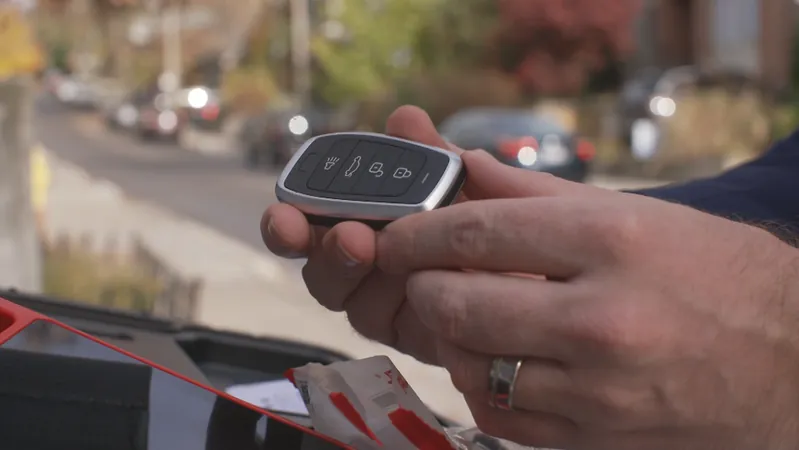
Shocking Discovery: How Easily Thieves Can ‘Steal’ Your Car with a Device Ordered Online!
2024-11-15
Author: Jacob
Shocking Discovery: How Easily Thieves Can ‘Steal’ Your Car with a Device Ordered Online!
In the latest jaw-dropping investigation by CTV W5, shocking revelations have emerged about the alarming ease with which modern vehicles can be stolen. The W5 team, led by correspondent Jon Woodward, conducted a real-life test using a device known for its potential to clone vehicle keys. This cutting-edge technology raises serious questions about car security in Canada.
The device in question can be purchased online, arrives at your doorstep in just a few days, and can be operational within an hour. This alarming revelation sheds light on a growing security vulnerability even as the total value of stolen vehicles skyrocketed to $1.5 billion in just the past year.
"Canada is facing a crisis," warns Elliott Silverstein from the Canadian Automobile Association. Statistics reveal a staggering 70,000 cars were reported stolen in Canada this year alone. Silverstein likens this epidemic of auto theft to a natural disaster occurring daily, urging immediate attention and action.
Despite the federal government's new regulations aimed at curbing auto theft, which reportedly led to a 17% decrease this year, the availability of key cloning devices remains a major concern. During discussions on restricting these devices, York Regional Police highlighted certain brands used by thieves, raising red flags on the connection between technology and crime.
In a daring experiment, the W5 team procured a device for approximately $835.07 from Amazon, described as a "key programmer" that allows users to clone vehicle keys. The device came equipped with universal key fobs and clear instructions on how to bypass security measures, even without the original key nearby.
On testing two vehicles from the CTV fleet, the team encountered mixed results. While the first attempt on a Chevrolet SUV failed due to connectivity issues, a second test on a Ford SUV was alarmingly successful. The newly programmed key allowed the team to start the vehicle and drive it away.
Experts in the field voiced their concerns regarding these devices. "These tools are readily available, and that is a significant problem," said Silverstein. The comparison to lock-picking tools sold online illustrates a gaping loophole in vehicle security.
In response to W5’s methodology, Ford representatives acknowledged that the circumstances of their tests do not reflect typical scenarios, as they began with unlocked doors and no alarm triggers. However, locksmith Yaser Jafar, who uses such devices for legitimate reasons, argues that thieves replicate these methods with ease.
Amazon has defended its marketplace, asserting that all listed devices are legal, although proper usage is often subverted. Meanwhile, the manufacturer of the device, New York-based Autel, is collaborating with authorities to mitigate the misuse of their technology, emphasizing that their tools are intended for professional locksmiths.
In a proactive move, Ford has introduced new security measures, such as the "Stolen Vehicle Services" for its F-Series trucks, which includes real-time tracking capabilities and alerts sent directly to vehicle owners. The 2025 models will also feature a new security package allowing owners to monitor their vehicles remotely.
For additional security, automotive experts like Ryan Jaipal recommend devices such as the Igla, which requires a password for operation, effectively preventing unauthorized use even if a key is cloned.
Silverstein advocates for stricter regulations on key cloning devices and urges manufacturers to bolster vehicle security to safeguard consumers. "The ease with which these tools operate is alarming, and it underscores the urgent need for improved security measures," he emphasized.
As vehicle theft evolves with technology, both consumers and manufacturers must stay vigilant. The W5 investigation has undeniably opened a Pandora's box concerning the relationship between modern vehicles and potential security breaches—a conversation that is far from over.









 Brasil (PT)
Brasil (PT)
 Canada (EN)
Canada (EN)
 Chile (ES)
Chile (ES)
 España (ES)
España (ES)
 France (FR)
France (FR)
 Hong Kong (EN)
Hong Kong (EN)
 Italia (IT)
Italia (IT)
 日本 (JA)
日本 (JA)
 Magyarország (HU)
Magyarország (HU)
 Norge (NO)
Norge (NO)
 Polska (PL)
Polska (PL)
 Schweiz (DE)
Schweiz (DE)
 Singapore (EN)
Singapore (EN)
 Sverige (SV)
Sverige (SV)
 Suomi (FI)
Suomi (FI)
 Türkiye (TR)
Türkiye (TR)